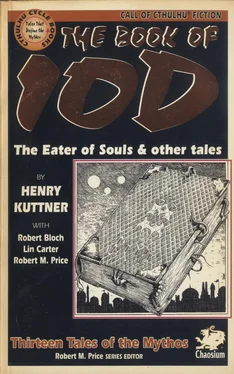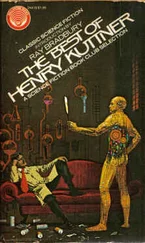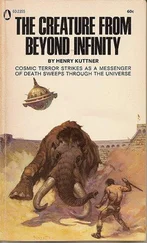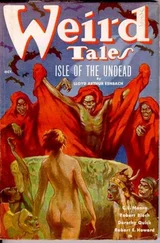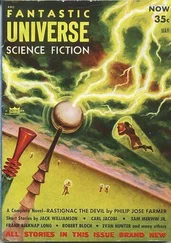Henry Kuttner - The Book of Iod
Здесь есть возможность читать онлайн «Henry Kuttner - The Book of Iod» весь текст электронной книги совершенно бесплатно (целиком полную версию без сокращений). В некоторых случаях можно слушать аудио, скачать через торрент в формате fb2 и присутствует краткое содержание. Год выпуска: 1995, ISBN: 1995, Издательство: Chaosium, Жанр: Ужасы и Мистика, на английском языке. Описание произведения, (предисловие) а так же отзывы посетителей доступны на портале библиотеки ЛибКат.
- Название:The Book of Iod
- Автор:
- Издательство:Chaosium
- Жанр:
- Год:1995
- ISBN:9781568820453
- Рейтинг книги:5 / 5. Голосов: 1
-
Избранное:Добавить в избранное
- Отзывы:
-
Ваша оценка:
- 100
- 1
- 2
- 3
- 4
- 5
The Book of Iod: краткое содержание, описание и аннотация
Предлагаем к чтению аннотацию, описание, краткое содержание или предисловие (зависит от того, что написал сам автор книги «The Book of Iod»). Если вы не нашли необходимую информацию о книге — напишите в комментариях, мы постараемся отыскать её.
The Book of Iod — читать онлайн бесплатно полную книгу (весь текст) целиком
Ниже представлен текст книги, разбитый по страницам. Система сохранения места последней прочитанной страницы, позволяет с удобством читать онлайн бесплатно книгу «The Book of Iod», без необходимости каждый раз заново искать на чём Вы остановились. Поставьте закладку, и сможете в любой момент перейти на страницу, на которой закончили чтение.
Интервал:
Закладка:
I seemed to be standing in a vast amphitheater of jet, and around me, towering to a sky sprinkled with an infinite multitude of cold stars, I could see a colossal and shocking city of scalene black towers and fortresses, of great masses of stone and metal, arching bridges and cyclopean ramparts. And with racking horror I saw teeming loathsomely in that nightmare city the spawn of that alien dimension.
Hundreds, thousands—surging multitudes of them, hanging motionless in the dark, clear air, resting quiescent on the tiers of the amphitheater, surging across the great cleared spaces. I caught glimpses of glittering eyes, cold and unwinking; pulpy, glowing masses of semi-transparent flesh; monstrous reptilian appendages that swam before my eyes as the things moved loathsomely. I felt contaminated, defiled. I think I shrieked, and my hands flew up to shut out that intolerable vision of lost Abaddon—the dimension of the Invaders.
And abruptly that other-world vision snapped out and vanished.
I saw the godlike, alien Face fleetingly, felt the cool glance of those strange, omniscient eyes. Then it was gone, and the room seemed to rock and sway in the grip of cosmic forces. As I staggered and almost fell I saw again around me the walls of the cottage.
The unbearable chill was no longer in the air; there was no sound but the pounding of the surf. The wind still sent the fog twisting past the window, but the brooding, oppressive feeling of age-old evil had utterly vanished. I sent an apprehensive glance at the shattered door, but there was no trace of the horror that had burst into the cottage.
Hayward was leaning limply against the wall, breathing in great gasps. We looked at each other dumbly. Then, moved by a common impulse, we went, half staggering, to the splintered gap where the door had been, out onto the sand.
The fog was fading, vanishing, torn into tatters by a cool, fresh wind. A starlit patch of night sky glittered above the cottage.
“Driven back,” Hayward whispered. “As they were once before— back to their own dimension, and the gateway locked. But not before a life was taken by them—the life of our friend—may Heaven forgive me for that—”
Suddenly he turned, went stumbling back into the cottage, great dry sobs racking him.
And my cheeks, too, were wet.
He came out. I stood at his side as he threw the time-pellets into the sea. Never again would he go back to the past. He would live henceforth in the present, and a little in the future—as was more fitting, decenter, for human beings to do—
The Frog
by Henry Kuttner
Kuttner had been at work on this tale long before it finally appeared. Fully three years earlier Lovecraft wrote him,
Your mention of “The Frog” interests me greatly, for it looks like one of my favorite sort of tales. If {Weird Tales editor Farnsworth} Wright rejects it, I trust you’ll let me see the MS’.—for I don’t want to miss the kind of item this appears to be! The atmosphere of dream-pursuit is surely ideal for anything of this nature. (May 18, 1936)
Wright must have spumed it, as HPL apparently anticipated, and it was three years before it would appear in the pages o/Weird Tales’ rival counterpart. Perhaps Wright thought it a bit too similar to “The Salem Horror”; if so, he was right.
Note that here Kuttner introduces his own eerie locale, Monk’s Hollow, a name evocative of isolated nocturnal rites practiced by renegade diabolist monks such as we associate with Lovecraft’s Exham Priory and with the brotherhood in Bloch’s “The Feast in the Abbey.”
First publication: Strange Stories, February 1939.
Norman Hartley knew little about the black legends which clustered about Monk’s Hollow, and cared less. Hidden in a secluded valley in the eastern hills, the ancient town had lain dreaming for generations, and a quaint and unpleasantly morbid folklore had sprung up from the tales the oldsters whispered about the days when witches had worked detestable sorceries in the festering North Swamp, a region which even yet was shunned by the villagers.
Monstrous things had dwelt in that stagnant morass long ago, they said, and the Indians had had good cause to name it the Forbidden Place. The witches had passed, and their terrible books had been burnt, their curious implements destroyed.
But the dark lore had come down furtively through the generations, and there were still some who could remember the night when, summoned by agonized shrieks, men had broken into halfwitted old Betsy Codman’s cottage and found her still-quivering body dangling in a Witch’s Cradle.
Norman Hartley, however, saw in Monk’s Hollow only a quiet, lonely little village where he might find the privacy which had been impossible in New York. Convivial friends were continually bursting into his studio, and instead of working on his canvases Hartley would find himself visiting the night clubs.
His work had suffered. In the ancient, gambreled house he had rented, two miles from the village, he felt that he could recapture the inspiration that had made his paintings famous.
But the Witch Stone bothered him.
It was a roughly chiseled block of gray stone, perhaps three feet high and two feet square, which stood in the flower garden behind the house. Hartley’s sense of artistic values was outraged every time he looked out of his window at the stone.
Dobson, the caretaker, had tried to train the flowers so as to shield it from sight; he had planted creepers about it, but the ground was apparently sterile. There was a little clearing of bare brown soil about the Witch Stone where nothing grew—not even weeds.
Dobson said it was because of Persis Winthorp, but Dobson was superstitious and a fool.
Whether Persis Winthorp actually lay buried beneath the stone or not, the fact remained that the block was an eyesore. One’s gaze passed casually over the gay colors of the garden, drawn irresistibly by the little barren clearing where the stone stood. Hartley, to whom beauty was almost a religion, found himself becoming irritated whenever his eyes rested on the Witch Stone. Finally he told Dobson to move it. The old caretaker, his seamed brown face puckered with apprehension, scraped his wooden leg across the floor and demurred.
“It don’t do no harm,” he said, giving Hartley a sideways glance out of watery blue eyes. “Besides, it’s a sort of landmark.”
“Look here,” Hartley said, unreasonably annoyed. “If I’m renting this house I’ve a right to move the stone out of the way if I don’t like it. And I don’t—it’s like a great ugly splotch of green in a sunset. It throws the garden out of symmetry. One would think you were afraid to touch it.” Hartley’s thin, studious face was flushed.
Hartley snorted, but the caretaker went on seriously. “I mind he told me once old Persis cursed Monk’s Hollow when they were ducking her in the pond. And they couldn’t drown her, either—not with the father she had, that came out of the North Swamp one night to—”
“Oh, for God’s sake,” Hartley said disgustedly. “So if the stone is moved she’ll pop up, eh?”
Dobson caught his breath. “You shouldn’t say things like that, Mr. Hartley. Persis Winthorp was a witch—everybody knows that. There used to be awful things going on in this house when she lived here.”
Hartley turned away. They were standing in the garden and he moved aside to examine the stone.
There were curious marks upon it, seemingly chiseled by inexpert hands. The rough figures had a vague resemblance to Arabic, but Hartley could make nothing of them. He heard Dobson stump up beside him.
“He said—my granddad—that when they were ducking her they had to get the women folks away. She came up out of the water all green and slimy, with her great mouth croaking out spells to nobody knows what heathen gods—”
Читать дальшеИнтервал:
Закладка:
Похожие книги на «The Book of Iod»
Представляем Вашему вниманию похожие книги на «The Book of Iod» списком для выбора. Мы отобрали схожую по названию и смыслу литературу в надежде предоставить читателям больше вариантов отыскать новые, интересные, ещё непрочитанные произведения.
Обсуждение, отзывы о книге «The Book of Iod» и просто собственные мнения читателей. Оставьте ваши комментарии, напишите, что Вы думаете о произведении, его смысле или главных героях. Укажите что конкретно понравилось, а что нет, и почему Вы так считаете.
